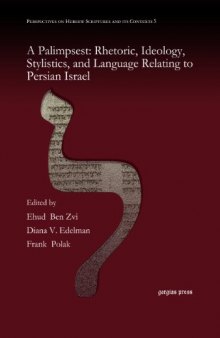 جزییات کتاب
جزییات کتاب
This volume contains revised versions of papers presented at the 2006, 2007, and 2008 meetings of the European Association of Biblical Studies as part of the activities of a Research Programme devoted to the study of “Israel and the Production and Reception of Authoritative Books in the Persian and Hellenistic Periods,” and some additional contributions. The basic question that the volume explores through the different approaches and questions raised by the authors is what can we learn by looking into the matters of biblical Hebrew linguistics, rhetoric, style, and ideology about the producers and readers of these books. What do they teach us about these literati’s world of knowledge and imagination, about the issues they had in mind and the ways in which they came to deal with them through authoritative literature? The inclusion of perspectives drawn from linguistics in this conversation is particularly valuable, since they are often absent from this type of conversation. Thus, the book includes essays on such issues as whether linguistic theories can solve literary-critical problems, on what is “late biblical Hebrew,” on parallelism and noun groups in biblical poetry, and the communicative meaning of some linguistic choices. There are studies on aspects of language, style, rhetoric, or ideology in the books of Genesis (in particular ancestor ideology), Samuel, Jeremiah, Nahum, Esther, Ezra (1-6), and Nehemiah, as well as on the reconceptualization of YHWH Sebaot as YHWH Elohim. Philippe Guillaume, Jean-Daniel Macchi, Robert Rezetko, Dalit Rom-Shiloni, Francesca Stavrakopoulou, Ian Young and the three editors contributed essays to this volume.
 درباره نویسنده
درباره نویسنده

احمد بن زینالدین احسائی (زاده:احساء ۱۱۶۶- درگذشت:مدینه: ۱۲۴۲ ق.)، معروف به «شیخ احمد احسائی»، بنیانگذار مکتب شیخیه است.
 دانلود کتاب
دانلود کتاب
 جزییات کتاب
جزییات کتاب
 درباره نویسنده
درباره نویسنده
 احمد بن زینالدین احسائی (زاده:احساء ۱۱۶۶- درگذشت:مدینه: ۱۲۴۲ ق.)، معروف به «شیخ احمد احسائی»، بنیانگذار مکتب شیخیه است.
احمد بن زینالدین احسائی (زاده:احساء ۱۱۶۶- درگذشت:مدینه: ۱۲۴۲ ق.)، معروف به «شیخ احمد احسائی»، بنیانگذار مکتب شیخیه است. 








 این کتاب رو مطالعه کردید؟ نظر شما چیست؟
این کتاب رو مطالعه کردید؟ نظر شما چیست؟
